Answer these simple questions and we will find you the BEST prices
Which type of solar quotes do you need?
It only takes 30 seconds
100% free with no obligation

Get up to 4 quotes from our selected suppliers by filling in only 1 form

Save money by comparing quotes and choosing the most competitive offer

Our service is 100% free and with no obligation
- Market-Inspector.co.uk
- Telephone Systems
- VoIP Phone
- VoIP Companies
What Is A VoIP Phone: The Best Guide For Companies

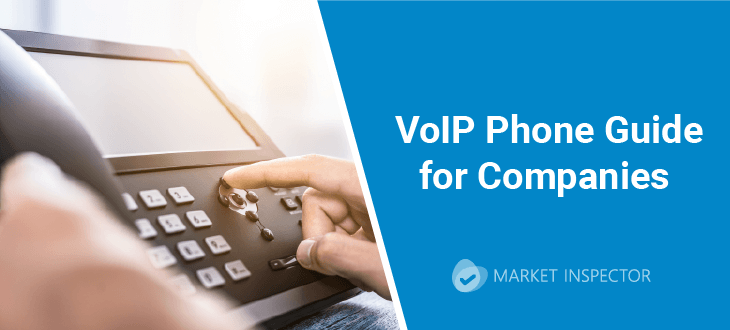
- A VoIP phone utilises the internet for making and receiving calls, unlike traditional phones that use circuit-switched technology.
- VoIP phones allow businesses to use portable landlines, which is ideal for remote work. Additionally, they provide excellent audio quality, conference calling, and advanced voicemail.
- You need a strong internet connection of at least 100 kbps to install a VoIP phone. After ensuring a solid connection, you can select a VoIP provider to assist you with the software and hardware installation.
- The average cost of a VoIP phone provider ranges from £5 to £40 per user per month. However, the cost of your internet provider and the type of VoIP phone you choose will also affect the overall cost.
- The most popular types of VoIP phones available in the UK include desk IP phones, cordless IP phones, softphones, video IP phones, and conference IP phones.
In today's digital age, efficient and cost-effective communication is crucial for any company's success. Burdened by high costs and inflexibility, traditional phone systems are quickly being replaced by modern VoIP (Voice over Internet Protocol) phones.
But what exactly is a VoIP phone, and why should businesses consider switching to it? This guide explores VoIP technology, detailing how it revolutionised communication by routing calls over the internet, providing significant cost savings and advanced features.
Whether you're a small startup or a large enterprise, understanding VoIP phones can help you make well-informed decisions to upgrade your communication infrastructure, enhance operational efficiency, and drive business growth.
At Market Inspector, we excel in providing professional assistance with VoIP phones to ensure you get the best system for your business. Fill out our quick form to receive four free, non-binding quotes tailored to your company. Click below to take the first step toward improving your business communication!
- Describe your needs
- Get free quotes
- Choose the best offer
It only takes 30 seconds

VoIP phone meaning explained
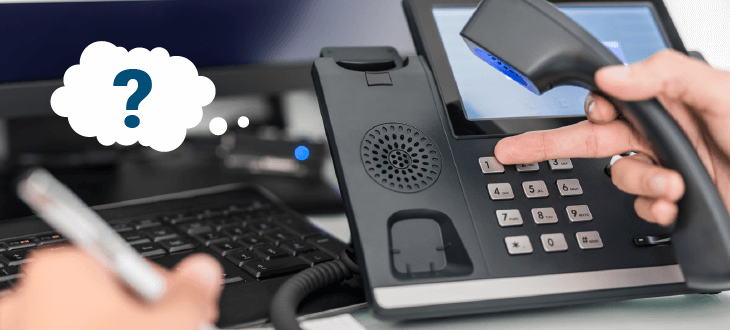
A VoIP phone, which stands for Voice over Internet Protocol phone, is a communication device that uses the internet to transmit voice calls instead of relying on traditional analogue telephone lines.
Since 1995, VoIP phones have converted analogue audio into digital packets, transmitting them over the internet.
This provides better flexibility and mobility, as calls can be made anywhere with an internet connection. By using the internet to make calls, companies can reduce costs on international and domestic calls.
While VoIP phones may look similar to conventional phones, they differ because traditional phones require a physical connection to a specific location.
Traditional phones use circuit-switched technology, which dedicates a single line to each call, often resulting in higher costs, especially for long-distance and international calls.
VoIP phones are an excellent choice for any business because they are flexible and cost-effective.
VoIP phones offer valuable features like portable numbers, call waiting and forwarding, conference calling, high-quality audio, call recording, and advanced voicemail. Their scalability allows businesses to easily add or remove users without extensive infrastructure changes, providing flexibility and future-proofing. Additionally, VoIP supports robust communication for remote and hybrid work environments, making it a worthwhile investment.
The installation of a VoIP phone
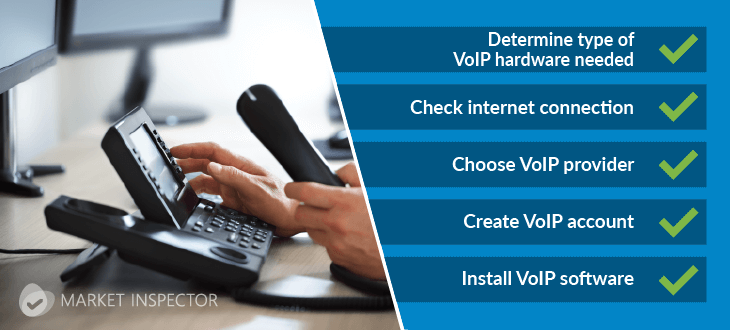
Installing a VoIP phone system is a straightforward process that brings significant flexibility and efficiency to business communications.
Before installing a VoIP phone, it is essential to determine your needs, including checking your internet connection, as a stronger connection makes the VoIP phone more reliable.
Successfully transmitting voice data requires a larger bandwidth. Nextiva recommends a minimum of 100 kbps (upload and download) per line.
Next, you will need to determine the hardware to choose from, which includes IP phones, analogue telephone adapters (ATAs) for converting traditional phones to VoIP, and a VoIP-compatible router to manage network traffic and prioritise voice data.
After determining the hardware your business needs, you must choose the best VoIP provider for your company. Consider factors such as price packages, features available, customer reviews, customer service, and security.
Once you have selected the best provider for you, you can set up an account and follow their instructions on properly setting up the system.
While software applications allow you to install a system to a smartphone or laptop via an application, IP phones are similar to traditional phones. However, they connect directly to the router using an Ethernet cable.
After you have successfully installed your VoIP phone according to your provider's instructions, you need to check and test the lines. Make a few test calls within your company to ensure that the audio quality is good and to see if there are any latency issues.
After ensuring your VoIP phone system works correctly, train your staff in all its features, including making and receiving calls, transferring calls, and using voicemail.
How much can a VoIP phone cost?

The cost of a VoIP phone in the UK can vary significantly based on factors such as the type of phone, required features, and the chosen service provider.
On average, a VoIP phone provider costs between £5 and £40 per user per month. Most VoIP providers offer payment plans ranging from basic to standard to premium.
Whether you choose a monthly or annual subscription also influences the cost. Annual payments will often be more cost-effective in the long term as providers provide a slight discount.
The type of phone you choose will also impact the overall cost. According to StartUps, a basic VoIP phone can cost around £35, whereas a premium phone can cost around £300 and is suitable for companies looking for maximum efficiency in their business.
Additionally, the broadband provider costs must be considered in the overall pricing for VoIP phones. According to the Independent, the average monthly broadband price in the UK is around £40.48.
VoIP phones offer significant savings compared to traditional phones, with lower call charges, reduced maintenance costs, and flexibility for growth.
By carefully selecting the right equipment and service plan, companies can achieve an efficient and cost-effective communication solution that meets their needs.
Traditional vs VoIP phones: pros and cons
Traditional and VoIP phones have advantages and disadvantages, making them suitable for different scenarios and needs.
VoIP phones transmit voice over the internet, providing significant cost savings, especially for international and long-distance calls, and reducing the need for extensive physical infrastructure. Here are the pros and cons of VoIP phones:
- Cost-saving
- Flexible and portable
- Better security
- Includes features such as voice mails, conferencing calls, call queuing.
- Power outages can disrupt calls
- Strong internet connection is required
- Latency and jitter issues can come up
Traditional phones operate over the Public Switched Telephone Network (PSTN) and are known for their reliability and consistent call quality, especially in areas with unstable internet connections. They require minimal technical knowledge to operate and maintain. Below are the pros and cons of traditional phones:
- Does not require internet connection
- Easy to use
- Perfect for emergency use
- Exceptional call quaility
- Can be expensive especially with long distance calls
- Higher maintenance and installation costs
- Scam calls are higher
- Requires physical installation
Choosing between a VoIP phone and a traditional phone depends on your budget, preferences, company location, and internet strength.
What type of VoIP phone is the best?
When selecting a VoIP phone, it's crucial to consider your specific needs and use case. VoIP phones are available in various forms, each suitable for different environments. By choosing the right one for your business and employees, you can boost productivity by up to 67%. It can lead to communication cost savings of 30 to 50%, making it a cost-effective solution, as reported by Tech.co.
The most popular types of VoIP phones for businesses are:
- Desk IP phones
- Cordless IP phones
- Softphones
- Video IP phones
- Conference IP phones
The best VoIP phone is the one that meets your business's communication needs offers essential features and fits your budget. Below, we provide further details on the top five most popular types of VoIP phones available in the UK.
Desk IP phones

Desk IP phones are crucial in modern business communication by offering advanced features that boost productivity and streamline operations.
These phones are known for their high-definition voice quality, ensuring clear and reliable communication and improving efficiency.
Desktop IP phones offer simple access to call management features such as call forwarding, call transfer, and conferencing.
Many models also seamlessly integrate with business applications like CRM systems, allowing users to manage workflows directly from their phones.
The scalability of desk IP phones makes them suitable for businesses of all sizes, enabling easy expansion or downsizing as needed.
Desk IP phones like the Cisco 8800 and Polycom VVX Series are popular. They are known for their durability, user-friendly design, and robust features, making them essential in offices and call centres.
Cordless IP phones
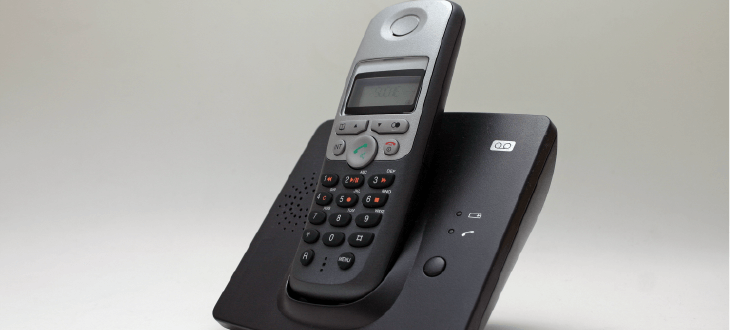
Cordless IP phones blend mobility with advanced communication features, making them ideal for dynamic business environments. These phones use DECT (Digital Enhanced Cordless Telecommunications) technology to provide secure and reliable wireless communication within a specified range.
Cordless IP phones are handy in retail stores, warehouses, and large offices where employees must stay connected while moving.
These phones provide advanced features such as high-definition voice quality, call forwarding, call transfer, and conferencing capabilities.
Popular models like the Gigaset N720 and Yealink W60P are known for their long battery life, robust range, and ease of use, integration with existing VoIP systems. By combining flexibility with VoIP technology, cordless IP phones enhance productivity and ensure uninterrupted communication across various professional environments.
Softphones

Softphones are software-based VoIP applications that run on computers, smartphones, or tablets, turning these devices into fully functional communication tools.
They offer great flexibility and mobility, allowing users to make and receive calls from anywhere with an internet connection.
This mainly benefits remote workers and businesses with distributed teams, ensuring seamless communication without dedicated hardware.
Softphones offer features, such as high-definition voice and video calling, instant messaging, voicemail-to-email, and integration with business applications. Popular softphone apps like Zoiper, Bria, and 3CX Softphone are user-friendly and effective for professional communication.
Using existing devices, softphones significantly reduce costs while offering the advanced features necessary for efficient and modern business operations.
Video IP phones

Video IP phones combine the functionality of traditional VoIP phones with high-quality video conferencing capabilities.
These devices have integrated cameras, large touchscreens, and advanced audio capabilities, enabling users to conduct face-to-face meetings seamlessly.
Video IP phones provide precise video and audio for more engaging communication. They benefit remote teams, virtual consultations, and customer service operations.
Popular models like the Yealink T58V and Cisco 8845 offer high-definition video and seamless integration with communication platforms, enhancing the communication experience in professional environments.
Conference IP phones
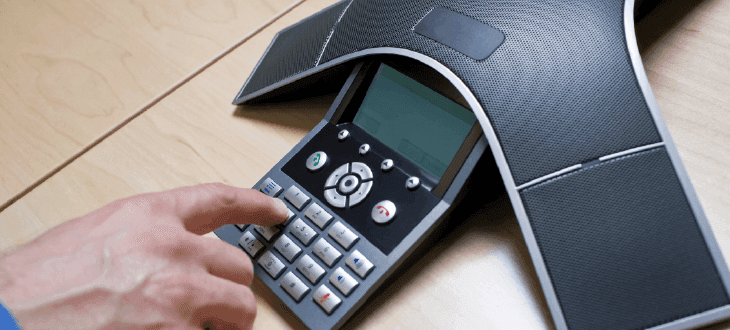
Conference IP phones are specialised devices that facilitate high-quality audio communication for group meetings. They are essential for boardrooms, conference rooms, and collaborative workspaces.
These phones have multiple microphones, advanced noise-cancellation technology, and 360-degree audio pickup. This ensures that every participant can be heard clearly, regardless of their position in the room.
Conference IP phones support call management features such as call recording, mute functions, and integration with conferencing software, enhancing the overall efficiency of meetings.
Models like the Polycom Trio 8500 and Yealink CP960 are renowned for their superior audio clarity, intuitive interfaces, and ease of setup.
Conference IP phones enhance collaboration, decision-making, and productivity by enabling seamless and clear group communication in professional settings.
Is a VoIP phone the best choice for your company?
Deciding if a VoIP phone system is right for your company depends on factors like your communication needs, budget, and growth plans. VoIP phones offer benefits such as cost-effective calling, advanced features, and flexibility for remote work.
Additionally, VoIP systems are highly scalable, making adding or removing users easy as your business evolves. A VoIP phone system is ideal for companies seeking cost savings and enhanced communication features. However, you will need to have a reliable internet connection for high-quality VoIP calls.
If you're considering a VoIP phone for your business, seek professional advice to get the best one for your needs and budget. Fill out our form to receive four free quotes from experienced suppliers who can help you make an informed decision. Click below to find out more.
- Describe your needs
- Get free quotes
- Choose the best offer
It only takes 30 seconds

FAQ
VoIP phones offer cost-effective communication, advanced features, and flexibility. They enable cheaper long-distance and international calls, call forwarding, voicemail-to-email, and video conferencing.
Yes, you can use a VoIP phone just like a regular phone. VoIP phones work similarly to traditional phones, enabling you to make and receive calls. However, instead of relying on traditional phone lines, VoIP phones transmit calls via an internet connection.
VoIP phones use the internet to transmit calls as digital packets. In contrast, traditional phones use analogue signals over copper wires.

Caoimhe is an experienced content writer and researcher who is passionate about providing accessible information to every reader. With a background in English literature and Sociology, she combines the two disciplines to create cohesive, well-thought-out, and well-informed pieces.
We strive to connect our customers with the right product and supplier. Would you like to be part of Market Inspector?

